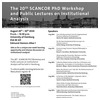This website provides a platform for scholars interested in new institutionalism - one of the leading theories in organization studies worldwide.
On this platform you can find out more about current developments, both in terms of theory and empirical research, details of workshops and conferences, recent publications, literature etc. It also enables you to become more closely networked with scholars to promote the exchange of ideas and research cooperation.
If you are interested in becoming part of the network and contributing to it, all you need to do is to become a member. You will then be able to find out more about „people“ - who is involved, "meetings" and relevant literature.
If you would like to become a member, then simply register. Within a short time, you will receive your own account for the members area.
News
|
RSO Volume on Organizing for Peace - Call for Submissions (11/30/25)
Please note the call for submissions to a Research on the Sociiology of Knowledge Volume on Organizing for Peace.
Deadline is December 30th: https://www.ambreenbenshmuel.com/organizing-for-peace |
 Reminder: 21st Workshop on New Institutionalism (NIW) (11/21/25) Reminder: 21st Workshop on New Institutionalism (NIW) (11/21/25)The deadline for our call for papers is approaching.
The workshop will take place at the University of Liverpool Management School on 26–27 March 2026. more... |
 Call for Papers: 21st Workshop on New Institutionalism (NIW) (10/8/25) Call for Papers: 21st Workshop on New Institutionalism (NIW) (10/8/25)University of Liverpool Management School, March 26–27, 2026 more... |
|
12th Austrian/ASSIOA Early Scholars Workshop in Management, May 22–23, 2025, Linz, Austria - Call for Submissions (2/14/25)
The Twelfth Austrian/ASSIOA Early Scholars Workshop in Management provides an opportunity for advanced PhD students and academics in early career stages from all countries to present their research and discuss it with colleagues and professors from international and Austrian universities. In addition to facilitating intellectual exchange, this program supports the development of a global network of Early Scholars interested in management and organization studies from institutional, organizational and behavioral perspectives. more... |
|
CfP for “model cases in organization sociology” at the 42nd congress of the German Association for Sociology, Duisburg, Sept. 22-26, 2025. (1/16/25)
Attached, please find a call for papers for the session “model cases in organization sociology” at the 42nd congress of the German Association for Sociology, University of Duisburg, September 22-26, 2025. more... |
|
CfP for the special issue “Functional lines of thinking: potentials and shortcomings” (1/16/25)
Attached, please, find a call for papers for the special issue “Functional lines of thinking: potentials and shortcomings”, accepted for publication in the journal “Thesis 11”. more... |
|
Workshop "New Data, New Concepts? Sociological Theory and Big Data in the Era of Computational Social Sciences" (1/12/25)
University of Bremen
June 12-13, 2025 Please see attached the Call for Submissions. Deadline: February 14, 2025 more... |
 Reminder: Call for Papers: 20th Workshop on New Institutionalism (NIW) (10/28/24) Reminder: Call for Papers: 20th Workshop on New Institutionalism (NIW) (10/28/24)Paris Lodron University of Salzburg,
March 27–28, 2025 more... |
 20th SCANCOR Public Morning Lectures on Institutional Analysis, Aug 26-30, 2024, Hamburg (7/16/24) 20th SCANCOR Public Morning Lectures on Institutional Analysis, Aug 26-30, 2024, Hamburg (7/16/24)Join us for a unique one-week learning opportunity and intense discussion on institutional analysis at the University of Hamburg. Each morning, two presentations will exemplify current developments in institutional analysis. more... |
